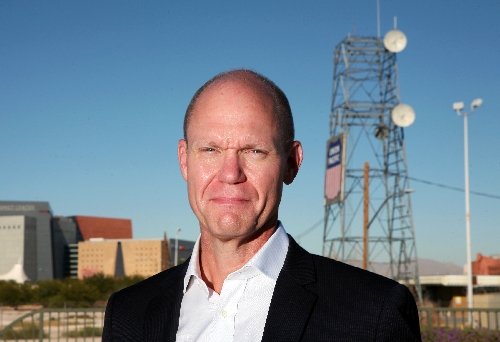Former NDA hires transit guru to forge new direction
The former Nevada Development Authority has hired a transportation guru to pave a new road toward economic development.
Local government affairs consultant Tom Skancke will take over Thursday as president and CEO of the nonprofit, now called the Las Vegas Regional Economic Development Council. Former president and CEO Somer Hollingsworth will oversee the council's new-business arm.
Along with its new name and leader, the group has an expanded mission beyond its previous, narrower goal of attracting nongaming businesses here. The new council also wants to keep existing local businesses from leaving. It's looking at cross-agency initiatives to build up education, culture and infrastructure. And it wants to accomplish those goals through fundraising, boosting membership and forging public-private partnerships.
"We've had a tough four or five years, and my goal is to really help rebuild Las Vegas," Skancke said. "I'm excited about what the future of Las Vegas looks like, and what I can do for the future. Everything I have done for the past 25 years in my career has led me to this door."
Skancke began his career here in the late 1980s, handling fundraising and strategy for political campaigns before taking over as development director for the Lied Discovery Children's Museum in 1988. He started The Skancke Co. in 1990, and made a national name for himself in transportation. He advised Congress on transportation policy, chaired a five-state commission to study the Canamex highway network from Canada to Mexico and helped get federal funding for the proposed Interstate 11 between Las Vegas and Phoenix.
Glenn Christenson, chairman of the council's board, said Skancke's experience landed him on the group's radar early in its CEO search. The search came down to nine candidates. It interviewed five before deciding Skancke was "the best man for the job," Christenson said.
"Tom is very familiar with our economic development needs. He has an excellent reputation among his clients, and great enthusiasm to succeed in this job and make Las Vegas a great place to live," Christenson said. "We looked at candidates from other parts of the country who were exceptionally qualified, but there would have been a learning curve as people got to know them and understand their capabilities. Tom can hit the ground running on Day One."
Skancke will have to hit the ground running to manage the group's agenda.
He said he plans to separate its functions into distinct "business lines," such as economic diversification, business retention and fundraising to support those other lines. The group is hammering out specific numbers goals, but Skancke said he wants to boost its annual budget well beyond its current $3 million, partly by adding to its membership of 250 companies, down from 417 businesses in 2007.
Skancke said he also plans to create 10 community initiatives in areas including telecommunications, infrastructure, education and culture, and he'll look for partnerships to make those initiatives happen. For example, he caught wind of a group trying to launch an art museum, and he plans to meet with them to talk about how to help the project, and how it could benefit economic development. He said he has a list of 100 people to speak with in his first month on the job.
Overall, said Christenson, it's a "holistic" approach to economic development that involves creating "ground-up" strategies involving the public and private sectors. It's similar to how the University of Nevada, Las Vegas is working with private groups to boost aerospace and defense contracts based on the city's proximity to Nellis and Creech Air Force bases, or how the university's graphic arts department can train programmers to design new gaming machines.
The group's higher reach was born of Southern Nevada's deep recession. When Las Vegas was the nation's fastest-growing city, there was little incentive for groups and agencies to work together on economic expansion, Christenson said. That changed in 2011, when Gov. Brian Sandoval unveiled the Governor's Office of Economic Development to simplify diversification. The office decided to concentrate expansion efforts on seven sectors, including aerospace, logistics, information technology, gaming and manufacturing. It also issued requests for proposals from agencies or groups that wanted to take over as broader, regional development authorities.
For the Nevada Development Authority, that meant banding together with city and county officials, as well as private businesses, to compete for that regional designation. The nonprofit's success in grabbing the role bodes well for additional collaboration, Christenson said.
"Putting together the (regional council) was an incredible accomplishment," he said. "For the first time in my 40 years here, a lot of disparate groups were working toward a common goal as it relates to economic development. In some ways, this horrible recession has been a blessing in disguise. It's forced us to think about our future."
Contact reporter Jennifer Robison at jrobison@reviewjournal.com or 702-380-4512. Follow @J_Robison1 on Twitter.

















